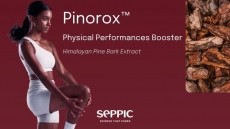Cherry juice blood boost may help halt cognitive decline: Study

The findings, made by a team from Northumbria University in the UK, found evidence of increased cerebral blood flow (CBF) to the brain’s cerebral cortex, indicated by increased haemoglobin (Hb) concentrations.
Despite this observation, the findings did not translate to improvements in cognition or mood post-consumption.
A number of dietary interventions using polyphenol-rich foods, particularly those including tea, ginkgo biloba, cocoa and blueberry, have shown benefits on memory and learning in humans.
One explanation could be in its efficacy in halting the decline in cerebral blood volume and metabolism of oxygen often seen in the ageing process.
The same team have previously found drinking this juice to be effective in reducing high blood pressure.
Here, men with early symptoms of hypertension reduced this by 7% after drinking Montmorency cherry juice.
Polyphenol power
This type of sour cherry has been the subject of a number of studies that have isolated the fruit’s rich polyphenol content that includes flavonoids such as isorhamnetin, quercetin, catechin, and anthocyanins.
It is thought these polyphenols have some role to play in controlling blood flow parameters that include increasing nitric oxide production and antioxidant status, reducing lipid oxidation and inhibiting inflammatory pathways.
In the study, 27 subjects aged 45–60 years received either a 60 millilitre (ml) dose of MC juice or a placebo.
Cerebrovascular responses, cognitive performance and blood pressure were assessed at the start of the study and at one, two, three and five hours following consumption.
There were differences of significance in the total Hb and oxygenated Hb concentrations one hour after drinking the cherry juice.
In addition, MC consumption significantly lowered systolic blood pressure over a period of three hours, with peak reductions of six millimetres of mercury (mmHg) one hour after drinking the cherry juice when compared to the placebo.
“In terms of higher total Hb concentrations, the modulation seen in the present study may be due to the vasorelaxatory and antihypertensive properties of some of the phenolic acids (vanillic and protocatechuic acid) contained in the MC concentrate,” the study hypothesised.
“Regulation of blood flow and cognition are extremely complex, with multiple overlapping regulatory mechanisms, paradigms and contributing structural components, and therefore more likely to be influenced by chronic supplementation.”
Taking the pressure off

As evidence, the paper referred to previous observations in which acute beetroot supplementation resulted in no changes to cognitive performance for concentration, memory, attention or information processing ability.
However, when older type-2 diabetics were supplemented with beetroot juice for 14 days, they experienced an improvement in simple reaction time compared with a control group.
“It would seem that the cerebrovascular response required to elicit measurable changes in cognitive function can only be achieved with longer-term dosing strategies that have the potential to induce sustained modifications to cerebrovascular function,” the study concluded.
A reduction of 6 mmHg in mean systolic blood pressure (SBP) was particularly notable in this study as previous observations have shown a reduction in mean SBP of 5–6 mmHg over a five-year period was linked with a 38% and 23 % lowered risk of stroke and coronary heart disease, respectively.
“This finding, along with the modulation of CBF one hour after MC consumption, supports the growing body of evidence showing an inverse association between the risk of chronic human diseases and the consumption of polyphenolic-rich diets.”
Source: British Journal of Nutrition
Published online ahead of print: doi.org/10.1017/S0007114516004177
“Montmorency Tart cherries (Prunus cerasus L.) modulate vascular function acutely, in the absence of improvement in cognitive performance.”
Authors: K. M. Keane et al.















